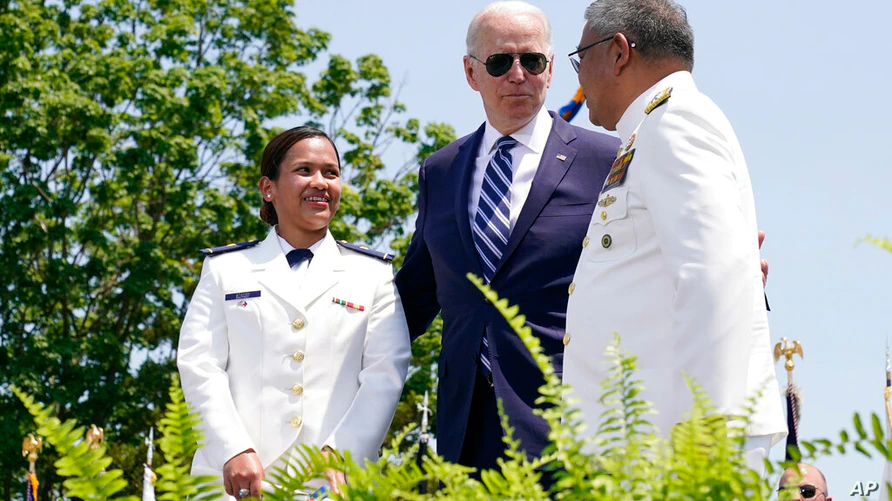
The U.S. Coast Guard will play a greater role in making sure "every country" respects international norms on the seas, President Joe Biden declared Wednesday.
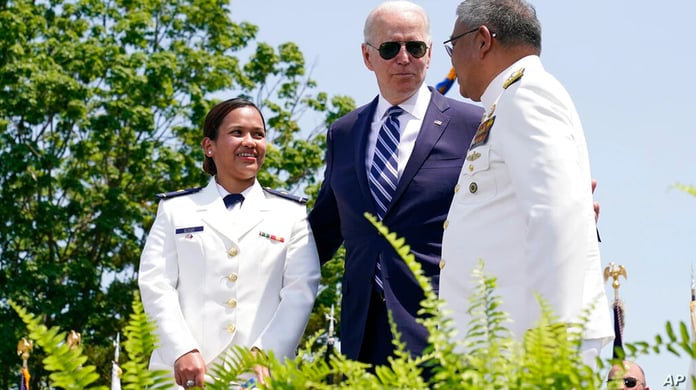
"Because of your reputation of professionalism and your unrivaled skill, the Coast Guard will be an increasingly central element in our engagement in the Indo-Pacific to protect lives, to preserve the environment and to safeguard sovereignty throughout the region," Biden told the Coast Guard Academy's graduating class.
"In the Arabian Gulf, we're in the process of deploying six new fast-response cutters to update patrols for Southwest Asia," he said. "The Coast Guard's expertise is helping our partners in the region to enforce maritime law and perform search and seizure operations."
The president also issued a public warning to China and Russia about their behavior on the oceans, saying he had discussed his concerns with Chinese President Xi Jinping and Russian President Vladimir Putin about violations of long-standing basic maritime principles such as freedom of navigation, which he termed "a bedrock of global economic and global security."
"When nations try to game the system or tip the rules in their favor, it throws everything off balance," the president said. "That's why we are so adamant that these areas of the world that are the arteries of trade and shipping remain peaceful, whether that's the South China Sea, the Arabian Gulf and increasingly the Arctic."
Patrols in far north
U.S. Secretary of State Antony Blinken this week has been attending the Arctic Council Ministerial meeting in Iceland, and there is significant bipartisan support in Congress for the U.S. Coast Guard patrolling in the far north.
"Russia and the Chinese Communist Party are increasing their malign influence in the region, testing the limits of the U.S. and our allies," Representative Michael McCaul, the lead Republican on the House Foreign Affairs Committee, said Wednesday.
"It is critical that this administration recognizes the strategic competition that is playing out in the Arctic, calls it what it is, and acts swiftly to counter it to ensure the Arctic remains a secure, environmentally sound and stable region," McCaul said.
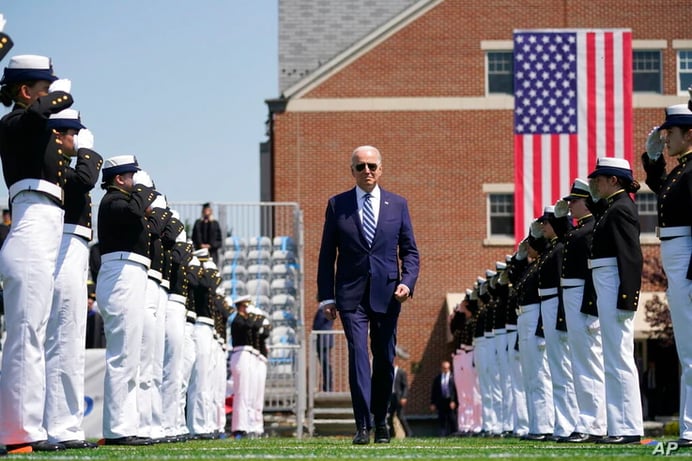
Biden said the unimpeded flow of global commerce would not continue without the United States taking an active role to set the norms of conduct "to shape them around democratic values, not those of autocrats."
"It's why we'll continue to support the United Nations Convention on the Law of the Seas, which outlines many of the key principles to ensure that our waters of our planet are not exploited by any one nation, but to preserve for the benefit of all," said Biden in his address in New London, Connecticut.
The president also singled out for notice a new Coast Guard partnership with Taiwan that "will help ensure that we're positioned to better respond to shared threats in the region and to conduct coordinated humanitarian environmental missions."
The United States and Taiwan have had no formal diplomatic relations since Washington broke off with Taipei in 1979 and recognized the Communist government in Beijing.
Duty in Strait of Hormuz
The president also noted that a U.S. Coast Guard cutter, operating alongside the U.S. Navy's 5th Fleet in the Strait of Hormuz, recently fired 30 warning shots to deter Iranian fast-attack boats' "irresponsible and unsafe maneuvers in the region."
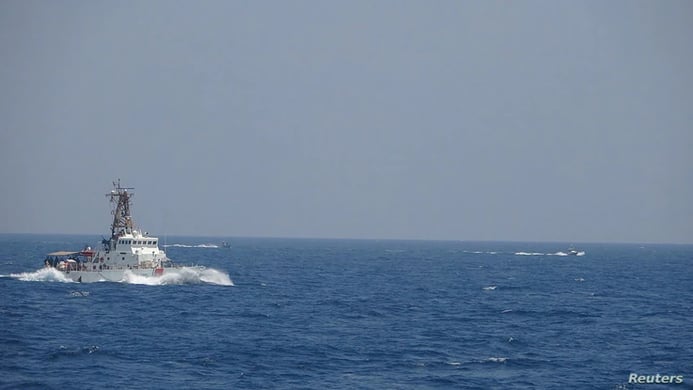
This was one of the Coast Guard's deployments, under its current 11 statutory missions, that took its vessels and personnel far beyond U.S. shores.
Since 2003, following a Defense Department request, the Coast Guard has been supporting military operations in and around Iraq.
The U.S. Navy does not have law enforcement authority, which is why police actions by naval vessels include members of the Coast Guard.
In addition to its traditional search and rescue and boating safety assignments in home waters, the Coast Guard's duties include icebreaking in the Arctic, narcotics interdictions off the coasts of Central America, fighting illegal fishing in the Pacific, and a frontline role intercepting smuggled weapons in the Persian Gulf.
To do all this, the Coast Guard needs more money, according to Craig Hooper, founder and chief executive officer of the Themistocles Advisory Group, a national security research group.
Coast Guard 'magic'
"Because the Coast Guard does not have much money, they work from a strong strategic template — often bringing the rest of the nation along with them — so any extra funding should support the planning they've already done," Hooper said. "If you pour too much money on this small, elite group, the nation risks losing the magic that makes the Coast Guard so effective."
Hooper, who is also publisher of NextNavy.com, told VOA he also worries that as Biden's Defense Department embraces a high-tech vision for national security, "the Coast Guard — the service that handles all the day-to-day work in the maritime that really preserves international order and peace at sea — will be ignored. Hypersonics, artificial intelligence and robots are great, but they aren't replacements for a Coast Guard boarding team."
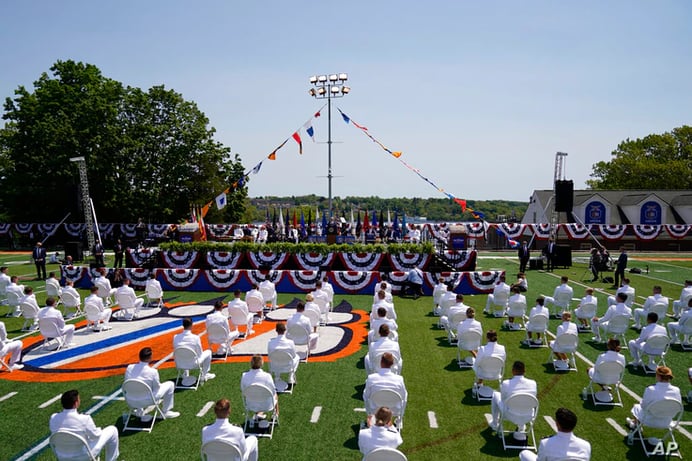
During Wednesday's commencement address, Biden said the Coast Guard "has always recognized the broader definition of our national security," which has blurred the distinction between it and the Navy.
"The Coast Guard, in essence, has become an adjunct of the Navy or the Navy's junior varsity, filling in for the starting lineup whenever there is need and when the Navy's pace of operations has become excessive," said Ted Galen Carpenter, vice president for defense and foreign policy studies at the Cato Institute. "It's the essential reserve force for the Navy at this point, not really focused on its traditional mission of close-in operations to guard the U.S. coast."
In times of war, Coast Guard units can be brought under the command of the Defense Department, but it is not intended to operate that way in peacetime.
Beginnings in 18th century
The Coast Guard calls itself the country's oldest continuous seagoing service, tracing its roots to a small 1790s fleet set up under the Treasury Department to enforce tariffs. It was moved in 2003 from the Transportation Department to the newly formed Department of Homeland Security.
Its fleet of vintage Hamilton-class cutters is making way for new Legend-class national security cutters following more than a dozen years of a rocky and controversial procurement process. Its fleet of fast-response cutters is always growing.
The Coast Guard's flag officers "certainly like a lot of the new toys that they're getting, which truly are cutting edge," Carpenter told VOA. "On the other hand, they're feeling the strain of the base of operations and the additional missions with which they have been tasked."
Source: VOA News
Related Posts
Is the Global Supply Chain the Next Big Cyber..
“Cyberwarfare is the greatest threat to the maritime transportation system,” warns U.S. Coast Guard..
The Biden administration is seeing its Middle..
In response to the Israel-Gaza conflict, the Biden administration prioritised containing the..
Coastal waters turning into ‘world’s biggest..
Africa's coastal nations are grappling with a surge in illegal, unreported, and unregulated (IUU)..



